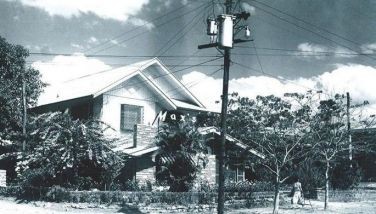The FPJ challenge
September 2, 2004 | 12:00am
The President and her party are by now in Beijing, having dropped by Guangzhou (Canton) to get a briefing on the SARS problem.
It’s interesting to note whom she’s meeting.
Aside from her immediate host, China’s President and Party General Secretary Hu Jintao, the President will be meeting former President Jiang Zemin – whom she already knows. Jiang, who belongs to the Third Generation leadership of China, may have relinquished the posts of Party Secretary General and the Presidency, to the younger Hu Jintao and his Fourth Generation of leaders, but he wisely insisted on retaining the leadership of the Army. When the chips are down, he who controls the People’s Liberation Army still has a very big say – if, theoretically speaking, any power struggle might ensue.
It is equally interesting that GMA is also meeting with Wen Jibao, the Premier of the State Council (elected in March 2003).
Wen, about 61, is the third-ranking member of the Politburo Standing Committee. He earned during the turbulent years that rocked the Communist Party, the sobriquet of "the survivor". Old China hands will remember that it was Wen, at that period much younger, who had accompanied then Party General Secretary Zhao Ziyang on the latter’s sympathetic and tearful visit to the student demonstrators at the height of the 1989 Tienanmen Square protests. When the violent crackdown came on the demonstrators, Zhao Ziyang fell into disgrace and was ejected from power, but Wen stayed afloat.
He found a new patron in the person of Zhu Rongji who was on the rise to the premiership eventually. Working with Zhu in the State Council, he helped Zhu in coming to grips with China’s nettlesome economic problems, and embedded himself firmly with the ruling group in Zhongnanhai, which is Beijing’s equivalent of the White House-Old Foggy Bottom-Capital Hill complex.
Even when he ran afoul of former Premier Li Peng, he managed to appease Mr. Li (who wanted to appoint his ally from Shandong province, Jiang Chunyun, the vice premier with special responsibility for agriculture). The compromise was to give Wen’s patron, the incumbent Vice Premier Zhu Rongji the coveted agriculture portfolio, with Wen merely working as his deputy in that field from 1993 to 1995.
He has since gained a big reputation as an economic manager, knowledgeable in both finance and agriculture. Perhaps it’s well that Wen is an introvert, a workaholic, and shuns confrontation. (He also keeps away from the media – probably a smart attitude on his part.) He is an apostle of rural development as well as global economic integration – two subjects in which GMA is interested.
Well, let’s see what comes out of these discussions.
Now that GMA’s in Beijing, she might as well look around. A friend (of Chinese ancestry) whose daughter works in Beijing, fluent of course in both Fookien and Putonghwa (Mandarin), just returned from more than a month – his 20th visit, I guess – in Beijing and Shanghai.
He said that Beijing is a forest of cranes – about 600 of them. The government and its contractors are rushing the infrastructure for the coming Olympic Games in 2007.
Perhaps $20 billion has already been spent on this activity – and the national government has already appointed a cabinet minister to coordinate decisions with Beijing’s mayor so there won’t be any crossed signals between the top leadership and the local government officials.
The goal is to complete all Olympic structures and infrastructures before the end of 2006, so 2007 itself can be devoted to "clean up" and the ironing out of any last-minute hitches, glitches and kinks.
We can learn a lot from the systematic way in which the Chinese are doing things. (They have the advantage, naturally, of being able to arrest crooks and corruptors with dispatch, even those as high-ranking as mayors and vice mayors, then trying them and executing those found guilty within weeks – not years. In sum, they give those found guilty, without a twitch of hesitation, the one-bullet salute. Remember, they execute 15,000 "criminals" a year, without agonizing about it, or being harried by the media, human rightists, or critics. We can deplore this all we want, but this seems to work for China. There are no terrorist attacks, or threatened beheadings. The terrorists, perhaps, are the ones terrorized.
China, too, has become a world power, judging from Athens, in the Olympics. America may have harvested the most gold, but, while Russia beat China in overall medals, thus coming in second in total medal count behind the United States, China came in third in total – but second in "gold count".
In sum, when the 2008 Olympics take place in Beijing – just watch their smoke!
The state, it’s clear, places emphasis on pushing its athletes to be the best – subsidizing sports and excellence, to the hilt. Perhaps it’s a case of "be the best – or else". What about us? We’re going to host the November 2005 Southeast Asian (SEA) games, yet our Rizal Memorial stadium still looks like a seedy garbage dump.
Olympic "gold" in Beijing 2008 in any event? The way we’re going in our dreams!
All we do, it seems, is debate, grandstand for the media, engage in hype and hip-hip-hoorah, and all sorts of puffery.
In our economic and fiscal crisis we’ll even manage to muddle through. But muddling through is not enough. Sanamagan.
You might have been misled by my title today, The FPJ challenge.
I’m not referring to our friend, the defeated (but still protesting) Opposition challenger, Ronnie, alias Fernando Poe Jr. I’m speaking of the Fiscal, Power, and Jobs crisis. These are key interrelated issues that have finally come home to roost and are staring every one of us in the face today.
The facts point to looming crises on all three fronts and that the issues have become inexorably linked. It’s recognized that our power sector needs upwards of P30 to P60 billion yearly just to keep up with power demands yet the sector is currently not attracting that kind of capital.
A power crisis would severely pare down economic growth and government revenues triggering fiscal crisis. If, God forbid, both crises should hit, unemployment – which already stands at 14 percent – will then soar through the roof and with it will surely come social and political chaos.
Although we are not yet in the midst of economic collapse, as the words may suggest, they do point up to how fragile our Philippine economy has become. We’re in this quagmire today as a result of too many years of political bickering, having rudderless and unpredictable economic policies and excessive amounts of populist decision-making from all three branches of government.
All this hasn’t resulted in "complete" crisis just yet since we’ve been able to "borrow" our way out of such mistakes and wrong decisions. The party’s about to end, however, with our consolidated public sector debt already reaching the unsustainable level of a whopping 130 percent of GDP. Way past the size of Argentinean debt relative to its economy before its collapse!
Philippine public sector debt has grown to such levels because of our government’s penchant for spending beyond its means. Since 1997 the Consolidated Public Sector Deficit (CPSD) has grown almost tenfold and the fastest growing component of that deficit has been the insatiable cash needs of NAPOCOR. For 2004, NPC has submitted deficit projections ranging anywhere from P100 billion to as much as P165 billion. If they fail to get its rate increase, those figures would hold true bringing its deficit to as much as one-third of the above-mentioned CPSD.
Despite our country already having high power rates relative to the rest of Asia, NPC continues to sell power at a huge loss. Its recent rate hike petition suggests it still needs an additional P1.87 per kilowatt-hour just to clear an eight percent return. Our politicians cry out that the "poor" cannot cope.
It’s all too apparent that our high dependence on imported fuels for the power sector has left us highly vulnerable to soaring energy prices worldwide. Fuel costs accounts for between 30-50 percent of the cost of electricity in this country. And peso equivalent prices of oil and coal have more than quadrupled over the last seven years. (What’s PETRON doing? Aren’t our "chiefs" there, like PETRON Chairman Nicanor "Nick" Alcantara, trying to hold the line by getting our partner Saudis to give us a supportive rate?)
We’re paying for past sins and omissions, of course for decades now the Philippines has neglected the proper development of its indigenous energy resources. Even today the tax and royalty burden on indigenous energy sources curiously continues to be higher than on imported fuels.
Most of our Asian neighbors are self-sufficient in fuels used for their power sectors. The few that are still highly dependent on imported energy such as Taiwan and South Korea, have gone nuclear (with its low running costs) to offset other expensive imported fossil fuels they must use.
However, rather than exposing the public to the true cost of power, successive Philippine government since 1997, have chosen to insulate them from it. The last nail in NAPOCOR’s coffin was the lowering of the PPA by P0.85 per kilowatt-hour and its capping at only P0.40 per kilowatt-hour in May 2002. This came on top of a P0.50 to P60 per kilowatt-hour subsidy it was already carrying for power costs not being charged to consumers. As a result taxpayer subsidies to NAPOCOR have grown progressively wider since then, up to magnitudes that can now engulf the country in crisis.
The saddest part of subsidizing power costs is that unknowingly even the poor who consume little or no electricity have suffered and are continuing to suffer greatly for it. Because debt servicing from all this now eats more than a third of government’s budget, basic services for health, education, farm-to-market roads, bridges, irrigation and the like have been whittled down to only fractions of what they used to be.
And if a "fiscal crisis" truly hits, the first to suffer again will be the poor. As happened in Argentina, millions will lose their jobs, lose their savings, not to mention the riots, looting and social chaos that will ensue.
I think it’s high time we recognize the crime of what’s been done. We’ve fooled the people into thinking they have power rates cheaper than the country can afford yet financed the illusion by irresponsibly taking away the basic services that government should be providing with our tax money. Without good health services and education, good roads, bridges and other infrastructure what hope do our countrymen have for a better life? Does hope only spring from the prospect of getting an overseas job as an OFW or can the masses of Filipinos look forward to good paying jobs domestically?
Seen in this context GMA’s new "FPJ Challenge" has become something akin to the mythical "Gordian Knot": A problem that’s become so perplexing it can only be solved by a single bold and decisive act.
Alexander the Great, when he encountered the age-old riddle of the Gordian Knot, didn’t bother to puzzle out how to "untie" it as his conquering predecessors had tried – and embarrassingly failed. He simply drew his sword and cut the knot in two – dismantling it completely.
La Emperadora GMA must act no less decisively – she must cut through all the blather and face reality. The reality is that our bankrupt government can no longer, ruinously, subsidize power rates. She can and must start by pushing for the
raising of the NPC’s rates to reflect true costs. Unpopular but necessary. If we’re bold enough to do it, we can begin to break out of the worsening cycle of crises in which our nation seems to be enmeshed.
It’s interesting to note whom she’s meeting.
Aside from her immediate host, China’s President and Party General Secretary Hu Jintao, the President will be meeting former President Jiang Zemin – whom she already knows. Jiang, who belongs to the Third Generation leadership of China, may have relinquished the posts of Party Secretary General and the Presidency, to the younger Hu Jintao and his Fourth Generation of leaders, but he wisely insisted on retaining the leadership of the Army. When the chips are down, he who controls the People’s Liberation Army still has a very big say – if, theoretically speaking, any power struggle might ensue.
It is equally interesting that GMA is also meeting with Wen Jibao, the Premier of the State Council (elected in March 2003).
Wen, about 61, is the third-ranking member of the Politburo Standing Committee. He earned during the turbulent years that rocked the Communist Party, the sobriquet of "the survivor". Old China hands will remember that it was Wen, at that period much younger, who had accompanied then Party General Secretary Zhao Ziyang on the latter’s sympathetic and tearful visit to the student demonstrators at the height of the 1989 Tienanmen Square protests. When the violent crackdown came on the demonstrators, Zhao Ziyang fell into disgrace and was ejected from power, but Wen stayed afloat.
He found a new patron in the person of Zhu Rongji who was on the rise to the premiership eventually. Working with Zhu in the State Council, he helped Zhu in coming to grips with China’s nettlesome economic problems, and embedded himself firmly with the ruling group in Zhongnanhai, which is Beijing’s equivalent of the White House-Old Foggy Bottom-Capital Hill complex.
Even when he ran afoul of former Premier Li Peng, he managed to appease Mr. Li (who wanted to appoint his ally from Shandong province, Jiang Chunyun, the vice premier with special responsibility for agriculture). The compromise was to give Wen’s patron, the incumbent Vice Premier Zhu Rongji the coveted agriculture portfolio, with Wen merely working as his deputy in that field from 1993 to 1995.
He has since gained a big reputation as an economic manager, knowledgeable in both finance and agriculture. Perhaps it’s well that Wen is an introvert, a workaholic, and shuns confrontation. (He also keeps away from the media – probably a smart attitude on his part.) He is an apostle of rural development as well as global economic integration – two subjects in which GMA is interested.
Well, let’s see what comes out of these discussions.
He said that Beijing is a forest of cranes – about 600 of them. The government and its contractors are rushing the infrastructure for the coming Olympic Games in 2007.
Perhaps $20 billion has already been spent on this activity – and the national government has already appointed a cabinet minister to coordinate decisions with Beijing’s mayor so there won’t be any crossed signals between the top leadership and the local government officials.
The goal is to complete all Olympic structures and infrastructures before the end of 2006, so 2007 itself can be devoted to "clean up" and the ironing out of any last-minute hitches, glitches and kinks.
We can learn a lot from the systematic way in which the Chinese are doing things. (They have the advantage, naturally, of being able to arrest crooks and corruptors with dispatch, even those as high-ranking as mayors and vice mayors, then trying them and executing those found guilty within weeks – not years. In sum, they give those found guilty, without a twitch of hesitation, the one-bullet salute. Remember, they execute 15,000 "criminals" a year, without agonizing about it, or being harried by the media, human rightists, or critics. We can deplore this all we want, but this seems to work for China. There are no terrorist attacks, or threatened beheadings. The terrorists, perhaps, are the ones terrorized.
China, too, has become a world power, judging from Athens, in the Olympics. America may have harvested the most gold, but, while Russia beat China in overall medals, thus coming in second in total medal count behind the United States, China came in third in total – but second in "gold count".
In sum, when the 2008 Olympics take place in Beijing – just watch their smoke!
The state, it’s clear, places emphasis on pushing its athletes to be the best – subsidizing sports and excellence, to the hilt. Perhaps it’s a case of "be the best – or else". What about us? We’re going to host the November 2005 Southeast Asian (SEA) games, yet our Rizal Memorial stadium still looks like a seedy garbage dump.
Olympic "gold" in Beijing 2008 in any event? The way we’re going in our dreams!
All we do, it seems, is debate, grandstand for the media, engage in hype and hip-hip-hoorah, and all sorts of puffery.
In our economic and fiscal crisis we’ll even manage to muddle through. But muddling through is not enough. Sanamagan.
I’m not referring to our friend, the defeated (but still protesting) Opposition challenger, Ronnie, alias Fernando Poe Jr. I’m speaking of the Fiscal, Power, and Jobs crisis. These are key interrelated issues that have finally come home to roost and are staring every one of us in the face today.
The facts point to looming crises on all three fronts and that the issues have become inexorably linked. It’s recognized that our power sector needs upwards of P30 to P60 billion yearly just to keep up with power demands yet the sector is currently not attracting that kind of capital.
A power crisis would severely pare down economic growth and government revenues triggering fiscal crisis. If, God forbid, both crises should hit, unemployment – which already stands at 14 percent – will then soar through the roof and with it will surely come social and political chaos.
Although we are not yet in the midst of economic collapse, as the words may suggest, they do point up to how fragile our Philippine economy has become. We’re in this quagmire today as a result of too many years of political bickering, having rudderless and unpredictable economic policies and excessive amounts of populist decision-making from all three branches of government.
All this hasn’t resulted in "complete" crisis just yet since we’ve been able to "borrow" our way out of such mistakes and wrong decisions. The party’s about to end, however, with our consolidated public sector debt already reaching the unsustainable level of a whopping 130 percent of GDP. Way past the size of Argentinean debt relative to its economy before its collapse!
Philippine public sector debt has grown to such levels because of our government’s penchant for spending beyond its means. Since 1997 the Consolidated Public Sector Deficit (CPSD) has grown almost tenfold and the fastest growing component of that deficit has been the insatiable cash needs of NAPOCOR. For 2004, NPC has submitted deficit projections ranging anywhere from P100 billion to as much as P165 billion. If they fail to get its rate increase, those figures would hold true bringing its deficit to as much as one-third of the above-mentioned CPSD.
Despite our country already having high power rates relative to the rest of Asia, NPC continues to sell power at a huge loss. Its recent rate hike petition suggests it still needs an additional P1.87 per kilowatt-hour just to clear an eight percent return. Our politicians cry out that the "poor" cannot cope.
It’s all too apparent that our high dependence on imported fuels for the power sector has left us highly vulnerable to soaring energy prices worldwide. Fuel costs accounts for between 30-50 percent of the cost of electricity in this country. And peso equivalent prices of oil and coal have more than quadrupled over the last seven years. (What’s PETRON doing? Aren’t our "chiefs" there, like PETRON Chairman Nicanor "Nick" Alcantara, trying to hold the line by getting our partner Saudis to give us a supportive rate?)
We’re paying for past sins and omissions, of course for decades now the Philippines has neglected the proper development of its indigenous energy resources. Even today the tax and royalty burden on indigenous energy sources curiously continues to be higher than on imported fuels.
Most of our Asian neighbors are self-sufficient in fuels used for their power sectors. The few that are still highly dependent on imported energy such as Taiwan and South Korea, have gone nuclear (with its low running costs) to offset other expensive imported fossil fuels they must use.
However, rather than exposing the public to the true cost of power, successive Philippine government since 1997, have chosen to insulate them from it. The last nail in NAPOCOR’s coffin was the lowering of the PPA by P0.85 per kilowatt-hour and its capping at only P0.40 per kilowatt-hour in May 2002. This came on top of a P0.50 to P60 per kilowatt-hour subsidy it was already carrying for power costs not being charged to consumers. As a result taxpayer subsidies to NAPOCOR have grown progressively wider since then, up to magnitudes that can now engulf the country in crisis.
And if a "fiscal crisis" truly hits, the first to suffer again will be the poor. As happened in Argentina, millions will lose their jobs, lose their savings, not to mention the riots, looting and social chaos that will ensue.
I think it’s high time we recognize the crime of what’s been done. We’ve fooled the people into thinking they have power rates cheaper than the country can afford yet financed the illusion by irresponsibly taking away the basic services that government should be providing with our tax money. Without good health services and education, good roads, bridges and other infrastructure what hope do our countrymen have for a better life? Does hope only spring from the prospect of getting an overseas job as an OFW or can the masses of Filipinos look forward to good paying jobs domestically?
Seen in this context GMA’s new "FPJ Challenge" has become something akin to the mythical "Gordian Knot": A problem that’s become so perplexing it can only be solved by a single bold and decisive act.
Alexander the Great, when he encountered the age-old riddle of the Gordian Knot, didn’t bother to puzzle out how to "untie" it as his conquering predecessors had tried – and embarrassingly failed. He simply drew his sword and cut the knot in two – dismantling it completely.
La Emperadora GMA must act no less decisively – she must cut through all the blather and face reality. The reality is that our bankrupt government can no longer, ruinously, subsidize power rates. She can and must start by pushing for the
raising of the NPC’s rates to reflect true costs. Unpopular but necessary. If we’re bold enough to do it, we can begin to break out of the worsening cycle of crises in which our nation seems to be enmeshed.
BrandSpace Articles
<
>
- Latest
- Trending
Trending
Latest
Recommended























